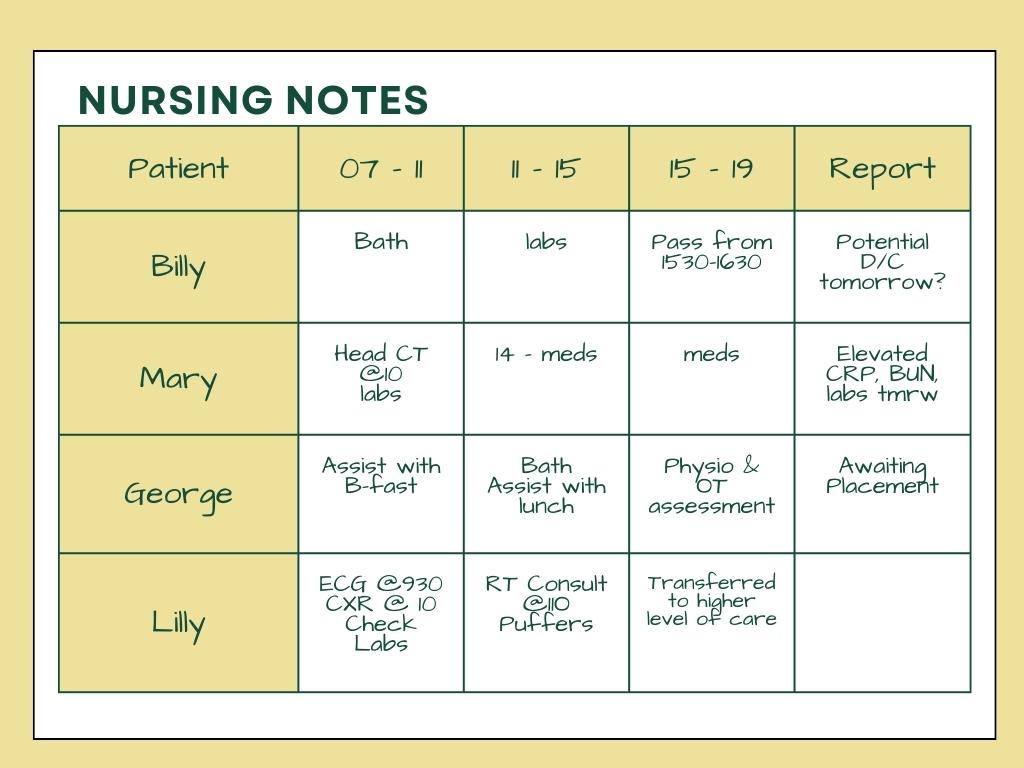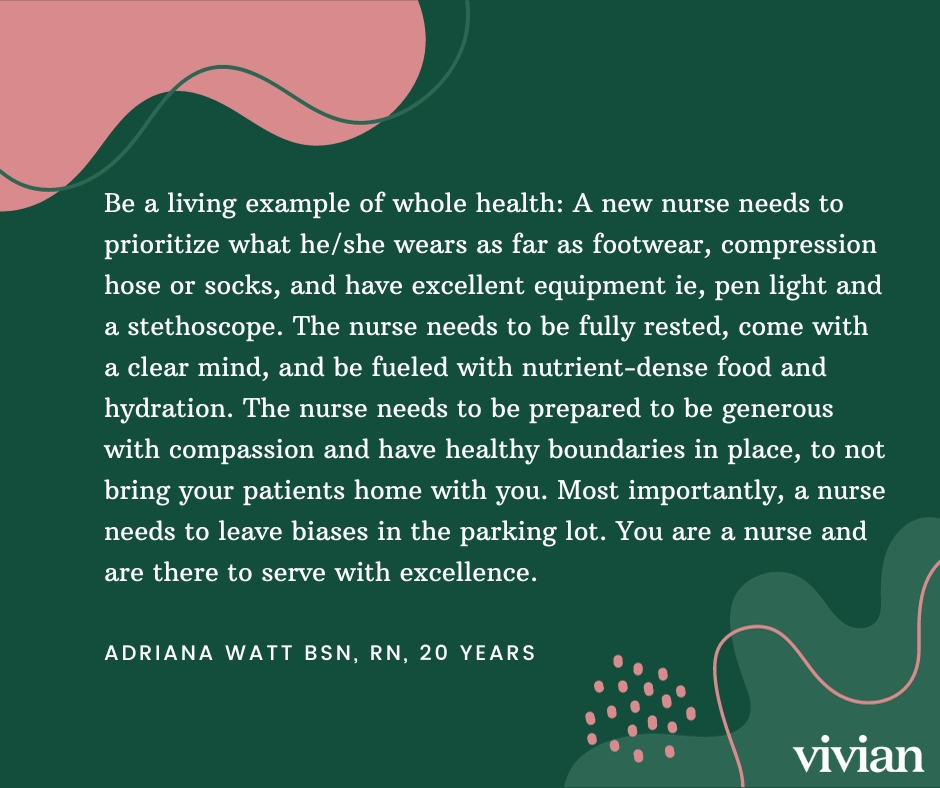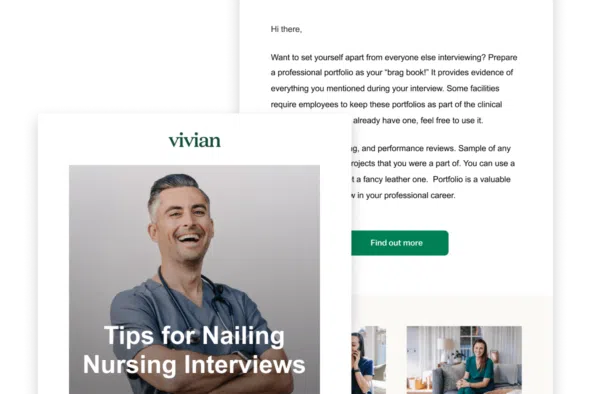Nursing school can seem like an endless journey when you’re deeply immersed in it. A constant cycle of assignments, exams and practicums, on repeat for four long years. But then, you wake up one day, and in the blink of an eye, you’ve completed nursing school.
Congratulations! You’re a new nurse grad. At this point, a mixture of nervous jitters and eager anticipation takes hold. While there are many things you know, the first year ahead is filled with just as many unknowns.
RELATED: You’ve Graduated from Nursing School. Now What?
At Vivian Health, we want your transition into nursing practice to be as smooth as possible. As a company that wholeheartedly supports nurses at every step of their careers, we especially want to support new grad nurses. In this article, you’ll find advice from senior nurses on what to expect during your first year and how to thrive as you embark on your nursing journey.
The Start of Your Nursing Career
Things become very real when you step onto the floor for the first time. As a student, you have a plethora of support behind you, with the added fact that it’s not your nursing license on the line. As a nursing student, you’re working under someone else’s license and under the umbrella of being a student. When you begin your nursing career, it’s the first time that it’s your license, and this hits differently. You must ensure that you have all your competencies and are taking the appropriate steps in your learning and practice to keep your patients safe.
Being a New Nurse Grad
Caitlin Goodwin, MSN, DNP, APRN, CNM, is a clinical editor, freelance writer and consultant for Mom Loves Best. She assures new nurses that “Every nurse feels that they have no idea what they are doing at the beginning of their career and are overwhelmed. Often, we try to mask our inexperience and figure it out by ourselves, but you are not alone.”
Rachel Koransky-Matson, DNP, APRN, FNP-C, is an Online Family Nurse Practitioner Clinical Coordinator at Regis College and reminds new grads to breathe and ask questions, “It’s okay to make mistakes but own up to them” and learn from them.
As the founder of Women of Integrity, Inc., Shantay Carter, BSN, RN, reminds new grads that “It’s better to ask a question than do something that you are unsure of how to do.”
Nancy Mitchell has been an RN for over 37 years and is currently the Director of Care on geriatric wards and a contributing writer at Assisted Living Center. She says, “Patient care is far more complex than the textbooks might let you in on. Your first months will develop your patience and emotional resilience. It will feel tough, but it doesn’t last forever.”
The beauty about your first year of nursing practice is you’re considered a new grad nurse – for the whole year. Use this to your advantage. Embrace the label of being a new grad nurse.
When I started my career, I remained a new grad until the next cohort of nurses arrived. I remember calling myself a new grad to a co-worker after the new cohort joined. She chuckled and said, “You’re not a new grad anymore. They are. Be ready for questions.”
Mitchell agrees and adds, “The next cohort of nurses will be coming in before you know it, looking to you for guidance and inspiration.”
Mentorship in Nursing
There’s a common theme among the senior nurses we talked to: the importance of finding a good mentorship program and the pivotal impression a good nurse mentor can have on your career.
Dr. Goodwin encourages new grads to “Build strong relationships with your colleagues. Specifically, the best option is to find a mentor and seek guidance from a supportive, experienced nurse.”
Tiffany Nielsen, DNP, APRN, FNP-C, ENP-C is an Assistant Clinical Professor and Alumni Faculty Advisor at the University of California, Irvine Sue & Bill Gross School of Nursing. She mirrors this sentiment while adding to trust in the process and continue to learn and grow independently and through your colleagues.
Seeking wisdom from seasoned colleagues, supervisors and mentors is like adding pages to a nurse’s decision-making playbook. Every situation, be it smooth or challenging, is a classroom. Be sure to reflect, share and educate yourself continuously.
Dr. Best was pleasantly surprised in her nursing career as her nursing colleagues and mentors evolved into lifelong friends she now considers family.
RELATED: 5 Benefits of a Mentorship in Nursing
How to Manage Common Challenges in Your Nursing Practice
You’ll face many challenges as a new grad nurse. Time management, adjusting to diverse clinical settings and navigating the emotional shift from classroom to bedside, among others. Recognizing these challenges as integral to your journey toward becoming a proficient and empathetic nurse is essential. Embrace both the exhilaration and the obstacles, as they’re the cornerstones of a rewarding and meaningful nursing career.
Time Management Challenges
Most days, completing all your work will feel impossible. Depending on your patient load and acuity, a lot is going on. Carter shares some very sound advice that resonates with me: You’re only one person, give yourself grace.
In a perfect shift, your entire to-do list would be complete. But in reality, there’s only so much you can do and some days, it will feel like there just aren’t enough hours in your shift. I’ve been an RN for almost a decade, and I still find solace in reminding myself that I’m just one person. It helps me slow down, focus on the task at hand and provide patient-centered care to the best of my ability.
Prioritizing and delegating are paramount to your success as a nurse and your patients’ well-being. Carter adds, “Remember that everything you do and don’t [do] will affect your patient.”
At the beginning of your shift, after report, create a habit of centering yourself and getting organized. Ask yourself some of the following questions and make a plan for your shift:
- Who are my most critical patients and what are the priority assessments?
- Which patients have blood work, tests, appointments, etc.?
- Are any patients being transferred out or discharged?
- What tasks need to be done today?
- Is there anything I must pass on to the doctor from the last shift?
Keeping your answers in mind, it’s imperative to figure out a way that works for you to remain organized throughout your shift. One helpful tip I share with new grads and mentees is to create a table on paper with patients listed in the left column and time slots on the right. Write patient-specific tasks under each time slot at the start of the shift and as they arise. Reserve the last column for any vital information you must pass on to the next shift. See the graphic below for an example.
It takes time to find your rhythm on the floor and learn a way that works best for you to stay organized while managing and prioritizing your time.
Emily Silver, FNP, IBCLC and co-founder of NAPS + Nurture by NAPS explains, “Just take it one thing at a time . . . one step, one action on the unit.” It can be easy to feel overwhelmed with all the new learning, but Silver says, “It just takes time.”
Dr. Goodwin reflects on her first year of nursing practice, saying, “I focused on learning time management techniques to effectively juggle multiple patients and review the healthcare facility’s procedures and policies during downtime. Nursing is challenging but gratifying, and you impact patients’ lives daily. Honor the progress that you are making as a new nurse and celebrate your successes, no matter how small they seem.”
Clinical Decision-Making
All your years of nursing school and practicums have adequately prepared you for the journey ahead. Your insight into anatomy, physiology, pharmacology and nursing theory truly unfolds in the real-world setting.
In your first year of RN practice, every encounter, every shift and every challenge becomes a stepping stone in refining your clinical judgment. It’s here that you begin to trust your intuition, weaving it seamlessly with evidence-based practices and each patient’s unique needs.
Maintaining a curious and humble mindset is critical as a nurse and contributes to ongoing learning and growth. Silver encourages, “Ask good questions to keep learning from each patient and shift and be curious to know WHY . . . why things are done a certain way or why a plan was made or why a med was ordered.”
This advice will be imperative throughout your career, especially in the first year. Hone your critical thinking skills to get the whole picture of what is going on with your patient.
At the core of clinical decision-making is the patient, always. Always tailor your approach to accommodate their individual needs, preferences and circumstances. Invite them and their families into the decision-making process, providing them with the knowledge to make informed choices about their health.
Patient and Family Interactions
Navigating patient and family interactions as a new graduate nurse is an essential skill that requires empathy, adaptability and effective communication.
In healthcare settings, emotions often run high and family members can play a significant role in decision-making. Always involve them when appropriate, respecting their preferences and cultural values. Dr. Koransky-Matson affirms that it’s a nurse’s job to stand up and advocate for patients and not be afraid to ask questions with their needs at the forefront.
Leanne T. Burke, EdD, MSN, CNM, RNC-OB is an Associate Clinical Professor, Pre-Licensure Program Director, UCI FATE Fellow and OEOD Sexual Harassment Advisor at the University of California, Irvine Sue & Bill Gross School of Nursing. She reminds new grads to “Realize that the patients are there for nursing care and need you. Be confident in your skills and knowledge and how much they need your care and presence to guide them through the most challenging times in their lives.”
Clear communication is crucial. Provide understandable explanations about diagnoses, treatment plans and potential outcomes. Acknowledge their fears and anxieties, offering support and reassurance. With practice and time, you’ll become proficient at fostering positive patient and family interactions, enhancing the healthcare experience for everyone involved.
Beware of Burnout
Many new grad nurses kickstart their careers with full-throttle dedication, aiming to gain experience and apply their hard-earned coursework. And, let’s be honest, pay off that student loan debt that had a surprising way of creeping up in four years. A sense of urgency, or something like a feast or famine mentality, embarks when you start working, especially if you’re casual or per diem. As a new nurse, I fell into this trap, picking up as much as possible, worried about the quiet season or when the work would dry up. I will tell you, after nearly a decade as a nurse, the work hasn’t dried up.
Although she’s been an RN for nearly four decades, Mitchell remembers the hustle of being a new nurse. She says, “Transitioning into full-time nursing can be challenging physically and mentally. You’re juggling between late night shifts and altered sleep schedules.”
As a new grad nurse, you’re particularly susceptible to burnout due to the steep learning curve, high workload and emotional demands of the profession. To avoid burnout, prioritize self-care. Establish a healthy work-life balance by setting clear boundaries. While it might be tempting to work a 16-hour shift or minimize your time off between shifts, always incorporate adequate breaks between shifts. Even with all the coffee in the world and that new coffee machine in the break room – you still need sufficient sleep.
Mike V. Bueno, PhD, MSN, RN, CNL is the HS Assistant Clinical Professor & Pre-Licensure Assistant Program Director and UCI Health Academic Practice Partner at the University of California, Irvine Sue & Bill Gross School of Nursing. He offers some sound advice when he suggests nurses shouldn’t take their work home with them.
“Purposefully schedule time to make you forget about the work day,” says Dr. Bueno. “Be more purposeful in having work-life balance.”
Recognize the signs of burnout early, such as increased irritability or exhaustion. Don’t hesitate to seek help from employee assistance programs or counseling services. Remember, self-care isn’t selfish. It’s essential for providing quality care to your patients and ensuring a long, fulfilling career in nursing.
Embrace the Journey
Each milestone you reach becomes a stepping stone in your personal and professional growth journey. These accomplishments affirm your capabilities and shape you into a confident and compassionate healthcare professional.
Celeste Baldwin, PhD, APRN, CNS, is the Assistant Professor of Nursing for the Online DNP Program at Regis College and reminds nurses, “Be resilient, flexible and ready to help . . . Take more self-care time . . . Make an effort to always self-improve through education and professional development.”
Your dedication, resilience and unwavering commitment to care will make a lasting impact on those you serve and inspire the next generation of nurses. So, with steadfast confidence and determination, step into your role as a nurse. You’re embarking on a journey filled with meaningful moments and the opportunity to make a real difference in the lives of others.
On those hard days, seek support from mentors and peers to navigate the challenges you face. Stay organized and manage your time effectively to reduce stress. Engage in stress-reduction techniques like mindfulness, exercise or creative hobbies outside work.
Above all, take this advice from Silver: “One patient and one day at a time.”
As you face the challenges, celebrate the victories and embrace the label of being a new grad nurse, remember that the impression you leave on patients and colleagues reflects the heart of the nursing profession.
Explore Vivian Health’s jobs marketplace today to find the perfect RN job with a facility that offers a supportive mentorship program to set you up for success in your long and fulfilling career as a nurse.







